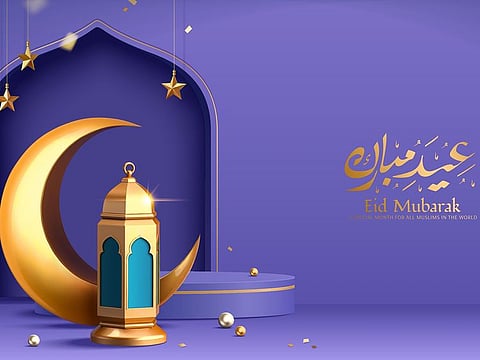Eid al-Fitr: Sharing joy, spreading hope, and building unity
It is a festival for everyone, celebrating peace and well-wishing for humanity

“O Lord! Make this month, a month of peace for us.” This was the prayer recited by the Prophet of Islam (may peace be upon him) upon sighting the crescent moon of Shawwal. This moon sighting marks the beginning of the tenth month of the Islamic lunar calendar, Shawwal, whose first day is celebrated as Eid al-Fitr. It signifies the end of the month of fasting, Ramadan.
This prayer, spoken by the Prophet of Islam, emphasises Islam’s importance on peace. It underscores the importance of peace as a crucial virtue necessary for any progress in life, both at an individual and societal level. The supplication is not limited to maintaining peace during the month of Shawwal but aims to establish a culture of peace that is upheld throughout the year.
Believers observe Ramadan to detach themselves from worldly activities and shift focus to the blessings God has bestowed upon them. The fasting month lets believers deepen their spirituality by studying and contemplating the Quran. During this time, they undertake deep reflection and assess the pattern of their lives. By patiently focusing on what they should and should not engage in, they strive to become a better version of themselves by the end of the monthlong fasting period.
The tradition of Eid goes back to the post-migration era. At Medina, the Prophet announced two significant occasions for praying and remembering God’s blessings: Eid al-Fitr and Eid al-Adha.
The spirit of Eid
The day begins with family and friends going to the nearby Mosque or Musalla to perform two raka’at (units) of Eid Prayers. The prayers are offered early in the day, and the prayer-goers pray to God to bless humanity and promote hope and well-being in society.
God Almighty has blessed us with countless blessings, and we are responsible for reflecting on and acknowledging these blessings. We should express gratitude in every moment of our lives. Eid serves as a reminder of these blessings and, at the same time, encourages believers to reach out and support those in need.
The feeling that comes from an act of compassion, such as sharing meals and other resources with those who need them, is undoubtedly a far superior act to spending the resources on oneself. Observing Eid al-Fitr as merely a day of eating, drinking, and making merry would diminish its importance and authentic spirit.
Every festival has a cultural aspect; visiting relatives and neighbours after Eid prayers and greeting them with ‘Eid Mubarak’ is the cultural part of Eid al-Fitr. ‘ Mubarak’ literally translates to ‘blessed’; thus, wishing ‘Blessed Eid’ to others is meant to nurture brotherhood and fraternal values. The Eid is also popularly known as ‘Meethi Eid’ in the subcontinent, which means ‘Sweet Eid.’
Although not a religious part of Eid al-Fitr, sweets represent the spirit of Eid. Throughout human history, the exchange of sweets has symbolised glad tidings. The sweets distributed on the day of Eid foster love and hope. The Prophet of Islam encouraged exchanging gifts to mark love and unity. As a result, Eid became a melting pot for instilling these virtues of harmony and tolerance in the society, embodied in the cultural ethos of the United Arab Emirates.
Revitalising the entire community
Believers are encouraged on Eid to continue helping people experiencing poverty, a habit they instill during Ramadan by donating Zakah and Sadaqah. Today, we live in times of great inequity; one approach to restoring balance is giving a certain amount of one’s wealth to those in need through Zakah and Sadaqah (charity). Zakah is the practice where a believer provides a certain percentage of their wealth over a certain amount to charity.
Zakah al-Fitr is required of all Muslims, young and old, men and women. Everyone with more than essential sustenance resources for one day and night shall pay Zakah al-Fitr for himself and his dependents and distribute it to those in need. The sooner money is distributed, the easier it is for people experiencing poverty to make plans to participate in the Eid celebrations without difficulties.
Eid al-Fitr reminds us that true satisfaction is in sharing God’s blessings. We should never overlook the needs of other human beings. The actual core of Eid is to share joy all around us.
Though Eid al-Fitr is a festival celebrated by Muslims worldwide, it is not just a celebration for Muslims, as people of other faiths are also welcome to join. Individuals and organisations organise local Eid get-togethers. It is a day to exchange with people from all walks of life. Thus, it won’t be wrong to call it a day of interfaith harmony that fosters tolerance and respect.
Eid is not only a day of celebration but also a day when a believer pledges to abstain from negativity throughout the year. They do their best to help those in need, just as they were concerned about their hunger and thirst during Ramadan.
In its true spirit, Eid unites people in harmony, thankfulness, and sharing, revitalising the entire community. It is a festival for everyone, celebrating peace and well-wishing for humanity.
Raamish Siddiqui is a lawyer, author and scholar. X: @raamishs



